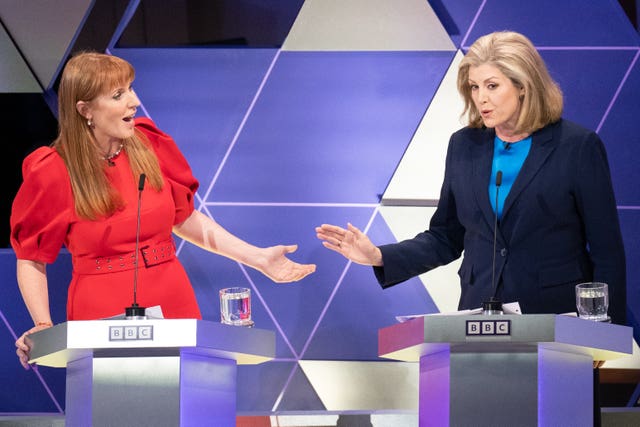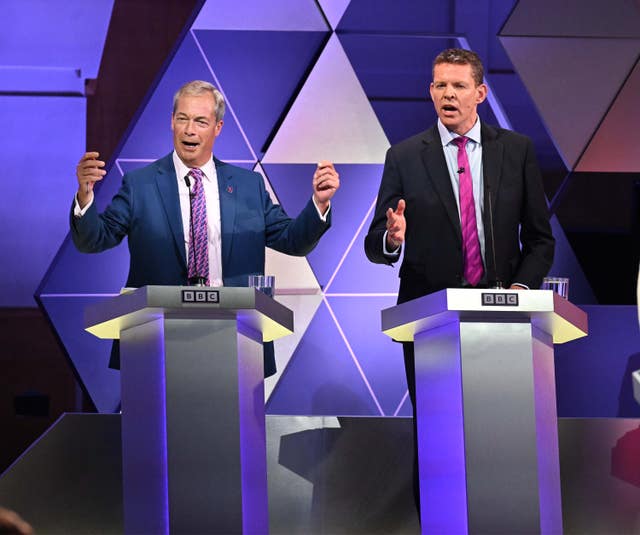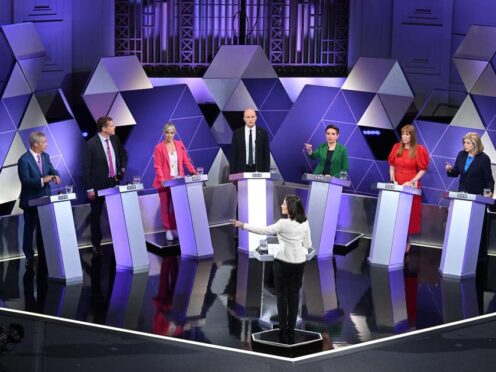The BBC General Election debate between seven senior political party figures was watched by more than three million viewers, the broadcaster has said.
An average audience of 3.2 million tuned in across BBC One and the BBC News Channel on Friday evening to watch the politicians clash over D-Day and support for war veterans, immigration and the state of the NHS, according to overnight ratings.
The line-up for the first multi-party debate in this year’s campaign featured Penny Mordaunt, the Conservative Leader of the House of Commons, Labour deputy leader Angela Rayner, Liberal Democrat deputy leader Daisy Cooper, SNP Westminster leader Stephen Flynn, Plaid Cymru’s Rhun ap Iorwerth, Green Party co-leader Carla Denyer and Reform UK’s Nigel Farage.

The debate had a peak in viewers towards the end of the broadcast, as figures rose to between 3.3 million and 3.4 million, the BBC said.
That is an increase from their seven-way debate in the run-up to the 2019 General Election, when an average audience of 2.5 million watched Rishi Sunak, then the Conservatives’ chief secretary to the Treasury, Labour’s Rebecca Long Bailey, Liberal Democrat Jo Swinson, the SNP’s Nicola Sturgeon, Adam Price of Plaid Cymru, the Green Party’s Caroline Lucas and Richard Tice of the Brexit Party go head-to-head.
During Friday’s debate, hosted by BBC news presenter Mishal Husain, Ms Mordaunt and Ms Rayner engaged in heated exchanges over tax, NHS waiting lists and the push for net zero.
Commons leader Ms Mordaunt continued to repeat the claim made by Prime Minister Mr Sunak that Labour would raise taxes by £2,000 if elected, prompting Labour’s deputy leader Ms Rayner to accuse Ms Mordaunt of lying.
A snap viewer poll taken after the debate placed Mr Farage as the winner.
The poll, conducted by researchers More In Common, asked more than 1,000 viewers who won the debate, with 25% of those surveyed opting for Mr Farage.
Among those who voted Conservative in 2019, 47% placed the Reform leader at the top of the pile.

Ms Rayner was favoured by 19% of the respondents while 14% said there was no winner. Just 7% of those surveyed said Ms Mordaunt was the winner of the debate.
Earlier in the week, the ITV debate between Mr Sunak and Labour leader Sir Keir Starmer was watched by an average of five million viewers, including those who watched on streaming service ITVX, the broadcaster said.
The head-to-head, moderated by Julie Etchingham, had a peak of 5.5 million across devices, according to overnight ratings.
This marked a sharp drop in ratings since the 2019 general election debate on ITV between Boris Johnson and Jeremy Corbyn, which was the first time the two leaders went head-to-head on TV during the campaign, and had an average audience of 6.7 million based on overnight ratings.
The record for the highest TV ratings for an election debate in the UK was set in 2010, by the first leaders’ debate between Gordon Brown, David Cameron and Nick Clegg, which was broadcast by ITV and had an average overnight audience of 9.4 million.
